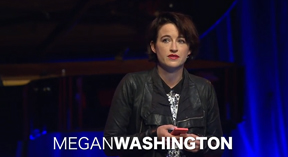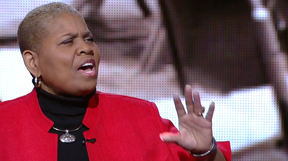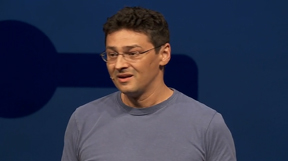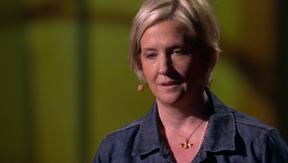Blog by Voon Pang
Aug. 5, 2014
I don’t know about you, but I love a good TED talk. There are some brilliant minds around the world and it is inspiring to listen to people talk about something they are so passionate about. The following 5 TED talks are some of my favourites. They have been played over and over again on my laptop. I hope that you can see the parallels with stuttering, whether you are a person who stutters, a parent of a child who stutters, or a speech-language pathologist. Enjoy!
Megan Washington: Thing Thing Is, I Stutter (filmed in 2014)
 In this talk, Australian singer Megan Washington talked about her stutter and her fear of public speaking. This talk was authentic and came straight from the heart. She openly discussed the common misconceptions she experienced when she interacted with strangers (“people often thought I was drunk”) and her own avoidances and ‘loopholes’ to remain fluent. My favourite part of Megan’s talk was when she demonstrated smooth speech and exclaimed, “That’s not actually me you know… I do use it when the economy of airtime is paramount... But as an artist whose work is based solely on a platform of honesty and being real that (using smooth speech) feels often like cheating”. She wraps up her talk with a TED sing and she has an amazing voice!
In this talk, Australian singer Megan Washington talked about her stutter and her fear of public speaking. This talk was authentic and came straight from the heart. She openly discussed the common misconceptions she experienced when she interacted with strangers (“people often thought I was drunk”) and her own avoidances and ‘loopholes’ to remain fluent. My favourite part of Megan’s talk was when she demonstrated smooth speech and exclaimed, “That’s not actually me you know… I do use it when the economy of airtime is paramount... But as an artist whose work is based solely on a platform of honesty and being real that (using smooth speech) feels often like cheating”. She wraps up her talk with a TED sing and she has an amazing voice!
https://www.youtube.com/watch?v=9MegHiL93B0
Rita Pierson: Every kid needs a champion (filmed in 2013)
 The late Rita Pierson was a force to be reckoned with. Born from parents who were educators and an educator herself, she insisted that “Every child deserves a champion, an adult who will never give up on them, who understands the power of connection, and insists that they become the best that they can possibly be.” As a speech-language pathologist, this reminded me to make a connection, to make a difference and to make the people I work with feel like they’re a somebody. I hope other speech-language pathologists and educators take note because as Rita put it so wisely, “Kids don’t learn from people they don’t like”.
The late Rita Pierson was a force to be reckoned with. Born from parents who were educators and an educator herself, she insisted that “Every child deserves a champion, an adult who will never give up on them, who understands the power of connection, and insists that they become the best that they can possibly be.” As a speech-language pathologist, this reminded me to make a connection, to make a difference and to make the people I work with feel like they’re a somebody. I hope other speech-language pathologists and educators take note because as Rita put it so wisely, “Kids don’t learn from people they don’t like”.
https://www.ted.com/talks/rita_pierson_every_kid_needs_a_champion#t-102872
Robert D’Angelo and Francesca Fedeli: In our baby’s illness, a life lesson (filmed in 2013)
 In my clinical practice, I often work with parents of children who stutter. Some parents cope well and manage to remain positive throughout the therapeutic process. Others need time and support, sometimes more than the child who stutters as there is often a sense of loss or grief. What accompanies loss and grief is worry, all of which can be natural reactions to the unexpected responsibility of raising a child who stutters. Robert and Francesca’s TED talk reminded me that parents go through a roller coaster of emotions and that speech-language pathologists need to be able to listen and counsel parents to help them deal with emotions. Although not an easy process to go through, Robert and Francesca’s message was profound. “We realised we needed that we had to become a better mirror for Mario…. We stopped looking at him as a problem…Consider what you have as a gift and not only what you miss, and to consider what you miss just as an opportunity.” With the right support and help, parents can often come to these conclusions and see their child as an opportunity to become ‘better than average’ communicators because their child has had to work so much harder on their communication skills.
In my clinical practice, I often work with parents of children who stutter. Some parents cope well and manage to remain positive throughout the therapeutic process. Others need time and support, sometimes more than the child who stutters as there is often a sense of loss or grief. What accompanies loss and grief is worry, all of which can be natural reactions to the unexpected responsibility of raising a child who stutters. Robert and Francesca’s TED talk reminded me that parents go through a roller coaster of emotions and that speech-language pathologists need to be able to listen and counsel parents to help them deal with emotions. Although not an easy process to go through, Robert and Francesca’s message was profound. “We realised we needed that we had to become a better mirror for Mario…. We stopped looking at him as a problem…Consider what you have as a gift and not only what you miss, and to consider what you miss just as an opportunity.” With the right support and help, parents can often come to these conclusions and see their child as an opportunity to become ‘better than average’ communicators because their child has had to work so much harder on their communication skills.
https://www.ted.com/talks/roberto_d_angelo_francesca_fedeli_in_our_baby_s_illness_a_life_lesson
Amy Cuddy: Your body language shapes who you are (filmed in 2012)
 Speaking of communication skills, Amy Cuddy’s talk on body language was fascinating to say the least. In this talk, she presents her research on “power posing” and its effects on testosterone and cortisol levels in the brain. This talk stuck with me because I work with a group of 7-10 year old children who stutter and our last session focused on body language and assertiveness training. I observed the more I asked them to role play assertive body language, the more confident they became. Amy’s talk provides evidence that we can make changes in as little as 2-3 minutes a day and that our bodies can change our minds as well as the inverse being true (our minds can change our bodies).
Speaking of communication skills, Amy Cuddy’s talk on body language was fascinating to say the least. In this talk, she presents her research on “power posing” and its effects on testosterone and cortisol levels in the brain. This talk stuck with me because I work with a group of 7-10 year old children who stutter and our last session focused on body language and assertiveness training. I observed the more I asked them to role play assertive body language, the more confident they became. Amy’s talk provides evidence that we can make changes in as little as 2-3 minutes a day and that our bodies can change our minds as well as the inverse being true (our minds can change our bodies).
https://www.ted.com/talks/amy_cuddy_your_body_language_shapes_who_you_are
Brené Brown: Listening to Shame (filmed in 2012)
 I first stumbled across Brené’s work when I was at the Michael Palin Centre for Stammering Children in London last year. My supervisor, Ali Berquez, talked about the gift of imperfection, vulnerability and shame and directed me to listen to this TED talk. Shame is a feeling that we all feel. It has deep roots in the stuttering community, as shame is a “focus on self” and the message is “I am bad.” When I work with children and adults who stutter, I aim to de-awfulize stuttering because shame is insidious. Brené talks about “empathy being the antidote to shame." Fuel to help shame grow exponentially is secrecy, silence, and judgement. If you are a person who stutters, douse shame by reaching out to someone who understands. In a world of social media, the opportunities are endless and it is easier to make a connection.
I first stumbled across Brené’s work when I was at the Michael Palin Centre for Stammering Children in London last year. My supervisor, Ali Berquez, talked about the gift of imperfection, vulnerability and shame and directed me to listen to this TED talk. Shame is a feeling that we all feel. It has deep roots in the stuttering community, as shame is a “focus on self” and the message is “I am bad.” When I work with children and adults who stutter, I aim to de-awfulize stuttering because shame is insidious. Brené talks about “empathy being the antidote to shame." Fuel to help shame grow exponentially is secrecy, silence, and judgement. If you are a person who stutters, douse shame by reaching out to someone who understands. In a world of social media, the opportunities are endless and it is easier to make a connection.
https://www.ted.com/talks/brene_brown_listening_to_shame#t-36263
Hope you enjoyed this post… Until next time, take care and look after yourselves!






 Podcast
Podcast Sign Up
Sign Up Virtual Learning
Virtual Learning Online CEUs
Online CEUs Streaming Video Library
Streaming Video Library